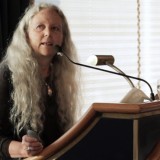I was delighted to learn recently that my good friend and colleague, leading salmon farming critic Don Staniford, won a major victory in the BC Supreme Court over the aquaculture industry – in large part thanks to an important legal precedent established by another good friend and colleague, Rafe Mair.
According to an opinion piece by Andrew Gage of West Coast Environmental Law, it was Rafe’s landmark victory at the Supreme Court of Canada a decade ago that formed the basis of Don’s victory in a defamation case brought against him last year by Mainstream Canada (the local arm of Norwegian global aquaculture giant Cermaq). At issue was a campaign the globetrotting British activist Staniford created comparing the salmon farming industry with Big Tobacco.
In his analysis of the case and judge’s ruling in favour of Staniford, announced two weeks ago, environmental law expert Andrew Gage explains how the precedent set by Mair’s victory in an unrelated defamation suit from his days on the radio at CKNW helped get Don off the hook today:
Don won because the Supreme Court of Canada has recently expanded the “defence of fair comment” in a case known as WIC Radio Ltd. v. Simpson. That case was a defamation suit against BC’s own Rafe Mair for comments that he made comparing a speech made by Kari Simpson on homosexuality to speeches made by Hitler and U.S. segregation era politicians. The Supreme Court of Canada allowed Rafe’s appeal, and in doing so, said that individuals who express honestly held opinions – as long as they are clearly opinions and not claims of fact – cannot be found guilty of defamation. The Supreme Court says that the defence applies where:
(a) the comment must be on a matter of public interest;
(b) the comment must be based on fact;
(c) the comment, though it can include inferences of fact, must be recognisable as comment;
(d) the comment must satisfy the following objective test: could any [person] honestly express that opinion on the proved facts?
(e) even though the comment satisfies the objective test the defence can be defeated if the plaintiff proves that the defendant was [subjectively] actuated by express malice.
Don’s case is the first defamation case that we’re aware of involving defamation by an environmental activist since the Supreme Court’s decision in WIC Radio, and Adair J. found that Don’s cigarette packages satisfied all of these criteria. In doing so, she made a couple of findings which will protect environmentalists and others seeking to comment on high profile public issues.
As Gage alludes to above, the campaign created by Staniford that led to Mainstream’s suit involved a series of cigarette package graphics – disseminated through his website, social media and print materials – containing images of the salmon farming industry and statements comparing it to the tobacco business. The essence of the comparison was more with regards to the industry’s PR tactics and corporate behaviour than medical matters, though many of the graphics raised specific health impacts for marine life and humans from its operations and products.
Staniford and his lawyer David Sutherland characterized Mainstream’s legal strategy as a SLAPP suit (Strategic Litigation Against Public Participation) – designed to shackle criticism of the company through the threat and reality of unwieldy legal costs. While Sutherland, acknowledged as one of the country’s top media and free speech lawyers, worked pro bono or at a reduced rate for much of the case, Don’s cause drew an outpouring of public support. In the end he raised $50,000 for his legal fund online, mostly through small donations, plus several other larger contributions from salmon fishermen’s unions, Norwegian anti-aquaculture groups and NGOs like West Coast Environmental Law.
I’ve had the privilege of working alongside both Don and Rafe for a number of years, doing battle with the Norwegian aquaculture giants around the world – and am proud of their significant contributions both to this cause and to the protection of free speech.
My assessment of Cermaq/Mainstream’s tactics in this case – apart from the legal dimensions, which are not my province – is that this Norwegian-Canadian Goliath allowed its own pride and bullying attitude to draw it into a battle it should never have waged.
Don had some valid points and he wasn’t the first to make them – in fact, the genesis of his campaign concept was a comment made by mutual ally and aquaculture critic Otto Langer in a documentary Don and I produced together a few years ago, called “Farmed Salmon Exposed”. In that film, the retired DFO senior scientist and manager equates the industry’s choice to deny steadfastly the growing body of evidence of its environmental impacts with Big Tobacco’s denial of health effects. But rather than agree to disagree with Don’s campaign, rebutting it through their own PR machine (which they did in abundance), they had to go one step further and bully him through the courts.
They saw Don was financially vulnerable and decided to attack him with a vengeance.
But Don had many assets on his side they failed to see: overwhelming public goodwill stemming from years of frustration with the industry – which translated into tens of thousands of dollars for Don’s legal fund – a skilled lawyer with a point to prove, and that little case won years ago at the Supreme Court by Rafe Mair.
In choosing to take this beef into the courts, Mainstream gambled and lost big time. Not only will they have to repay some of Staniford and Sutherland’s legals costs as part of the court’s judgement, but they suffered yet another black eye in the media.
As Andrew Gage asserts in his insightful post-mortem, Staniford’s case is a “victory for free speech” and “give[s] environmentalists some comfort that they won’t be held liable for any controversial statement made about corporations.” Yet it also underscores how heavily the legal process has become weighed toward corporations – and should prompt renewed discussion about tilting the balance more in the direction of free speech and social activism:
…the decision does nothing to address the broader problem of allowing large corporations with extremely deep pockets to drag their political opponents into court. The costs of going to court (and defamation cases are particularly expensive) are prohibitive for activists, but are a tax deductible expense for big companies. The result is an unequal playing field where those who speak out against environmental destruction risk being sued by deep-pocketed opponents.
Gage and Sutherland both offer solutions, including legislative changes to ban corporate lawsuits in defamation and specifically restricting SLAPP suits. Clearly, Don’s case brings these concerns to the fore again and it’s high time we had this discussion at the political level, instead of relying on costly courtroom battles to decide these matters one precedent at a time.
For the moment, though, I offer a pat on the back to my two friends and colleagues, Don and Rafe, for their ongoing commitment to the environment and free speech. Both have the balls to take on Goliath and the skill to land one between the eyes every now and then.



